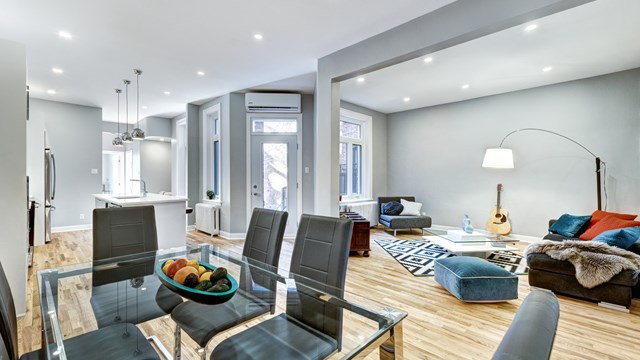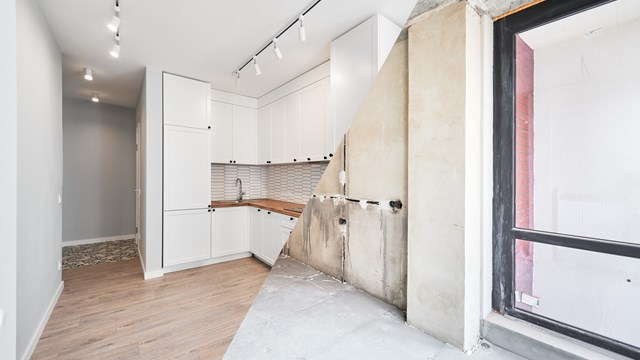
There are lots of ways for homebuyers to find properties for sale, but regardless of whether one finds their prospective dream house online, sees a “For Sale” sign in a building, or gets a hot tip word-of-mouth, at some point buyer and property need to meet in person, as it were. That could be why open houses have long been a staple of the sales process in New York area condos and co-ops.
C'mon By...
For the real estate novice, an open house is basically where a gaggle of prospective buyers descend upon a property and mill around, looking it over and picturing themselves living there. Open houses are a great way for realtors to connect buyers and sellers—but they can pose certain concerns for boards, property managers, and neighbors in terms of safety and security, nuisance, and traffic.
Maura Jarach of Keller Williams Realty, who has multiple listings throughout New Jersey, stresses the importance of managing the expectation of the owners and preparing the property properly for all visitors and potential buyers.
“I represent and research the rules of a particular building well in advance of my arrival,” she says. “I have seen other agents lose their privilege to hold open houses in some buildings when rules are not followed and a neighbor reports misconduct etc.”
Sarah Orlinsky-Maitland, a realtor and real estate blogger, had one open house recently where more than 60 people showed up. While a successful outcome like this is well received, it was important to manage everything closely to ensure than no building rules would be broken.
One concern in this scenario was controlling the elevators. With so many people coming and going, she limited access to 10-minute intervals to make sure that the home seekers weren’t monopolizing the elevator for residents.
“Noise, unruly or disrespectful behavior are also concerns,” she says. “Unattended visitors can forget that they are in a home or in the common area of a building.”
Carol Staab, a real estate agent with Manhattan-based Douglas Elliman Real Estate, says you also need permission from your client before conducting an open house. While it seems like a no-brainer to help sell a home, not everyone is inclined to do so.
“Once you get permission from all involved, you need to promote the open house well within the real estate community and the public,” she says. “I like to do it only by appointments, and I try to schedule them about 20 minutes apart.”
As a way to appease neighbors in the building, Staab also sends out invitations to the residents so they can see the process.
“The most important part of holding a successful open house in marketing,” is word-of-mouth, says Ellason Curdgele, a broker sales associate at Coldwell Banker in Jersey City. “You have to tell your neighbors, your friends, everyone. Personally, what I do is make flyers and I mail them out to the immediate neighbors. I’ll go to the nearest mall and the nearest church and hand them out. I make sure it gets out there that there is a house or unit available and the we are going to be there with the doors open at that date and time.”
Rules and Regulations
Orlinsky-Maitland begins thinking about an open house as soon as a contract is signed with a seller and her first step is to always contact the manager to find out what protocol is in regards to access to the building and its amenities.
“A basic rule is to use common sense. You are targeting a specific audience. It is important to keep in mind what the likely preferred time your audience is expected to show up,” she says. “If that interferes with house rules, you’ve got to find a way to entice your audience within the boundaries imposed by the building.”
Many buildings require an appointment and notice for holding an open house and some will limit the amount that can be held simultaneously at one time. Jarach says a smart move is to choose a time frame that includes other open houses in the surrounding area to capitalize on the flow of traffic and increase the overall turnout.
Every building is different and regardless of what its rules are, an agent must respect the rules that have been put in place. Experts say the best thing is to have clearly defined written rules for brokers to abide by.
“We had a building that was self-managed. The board president requested that we post a note in the building on the bulletin board 24 hours before the open house. Not being a neighbor to that location, it was an extra step that we performed optimistically on Saturdays before a scheduled open house,” Orlinsky-Maitland says. “Other buildings sometimes want a fax addressed to the doormen so they are aware of the incoming traffic.”
Staab says there are some buildings that don’t allow open houses at all—especially the luxury market. One condo she deals with won’t even allow you to use its name and address to promote or advertise an opening. In some cases, brokers can sometimes invite certain people by appointment if management approves.
Secure and Insured
The last thing anyone wants is a bunch of errant visitors walking around their hallways, common areas or taking up parking spaces near their home, but that’s exactly what can happen when open houses are held.
“I always try and get business cards from everyone if possible, because sometimes you can’t read their writing when they sign in,” Staab says. “In some circumstances, I think it might be a good idea to ask people for an ID and let the concierge or doorman control that.”
Some buildings have an “escort rule” as well. This means that potential visitors must be escorted to the property where the open house is being held. Violating this building rule can cause friction in the building and damage an agent’s reputation.
Real estate experts advise sellers to store away items of value to them. Another step to take is to have enough bodies in the property to watch people. If it is a studio and you can keep an eye on things fine, however if you have a 2- or 3-bedroom home to show, having additional agents along to air on the side of caution is always a smart thing.
“I always have a co-worker (licensed agent) working with me at open houses, even for a studio. You never know if someone will want to visit the roof deck, while someone else is still in the apartment,” Orlinsky-Maitland says. “Or if you’ve got a huge turnout, you want one person maintaining traffic control, while the other focuses on being available to agents and buyers viewing the apartment.”
As for insurance, those selling the unit would be responsible for any coverage and an association’s coverage would kick in if someone was to meander off and slip and fall, steal something or cause damage elsewhere in the condo.
A broker can be jointly held liable for not warning buyers of unsafe conditions/defects that may cause injury.
“I make sure that people put everything away and clear things off the floor so you don’t have to worry about people tripping or having an injury,” Staab says. “That’s not something that really happens, though.”
“I always have another realtor with me and I’ll have that person stationed at the front door,” says Curdgele. “That way no one can walk in unannounced and I feel free walking throughout the property with buyers. That protects the homeowners and it protects the buyers. I try to tackle problems before they arise. For example the realtor at the door would be asking people if they are really looking for that particular type of home and in that price range before we let them in. That way we can sense if they have any ill intentions.”
Final Thoughts
There are a number of ways that condo associations can do their part to keep the disruptions from an open house to a minimum. This includes everything from notifying the neighbors that an open house is taking place, limiting traffic, keeping track of all visitors and making sure that the realtor knows all the rules and expectations.
An open house is a great way to bring in people that might otherwise have missed the buying opportunity and show people all that’s great about your condo.
Keith Loria is a freelance writer and a frequent contributor to The New Jersey Cooperator. Staff writer Christy Smith-Sloman contributed to this article.






Leave a Comment